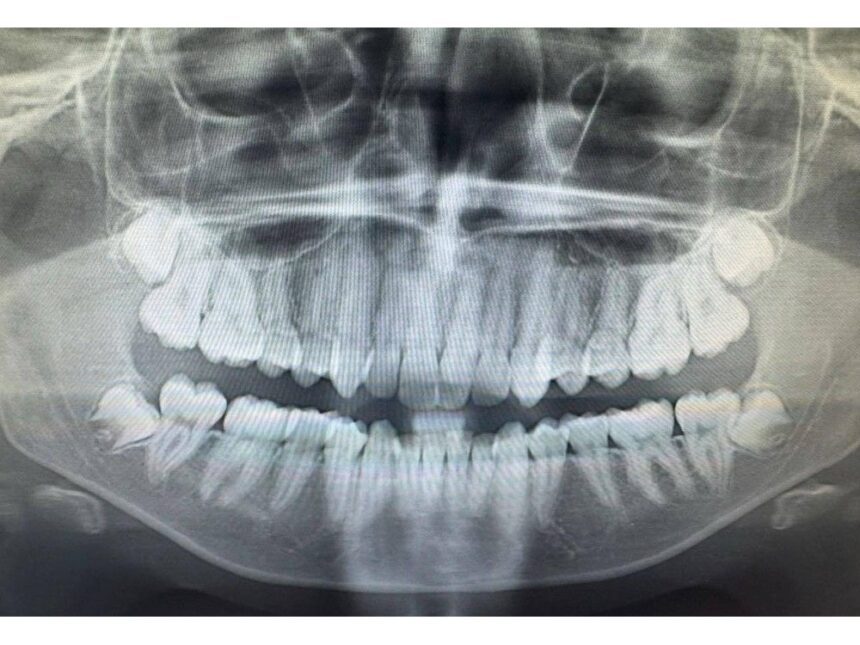A NS dentist offers tips for getting through wisdom tooth removal and recoveryPublished Jul 02, 2025Last updated 6 minutes ago6 minute readPeople often wait too long to have their wisdom teeth removed. ContributedArticle contentLiv Silver of St. John’s, NL, recently joined the ranks of young adults who have had their wisdom teeth removed.THIS CONTENT IS RESERVED FOR SUBSCRIBERS ONLY.Subscribe now to access this story and more:Unlimited access to the website and appExclusive access to premium content, newsletters and podcastsFull access to the e-Edition app, an electronic replica of the print edition that you can share, download and comment onEnjoy insights and behind-the-scenes analysis from our award-winning journalistsSupport local journalists and the next generation of journalistsSUBSCRIBE TO UNLOCK MORE ARTICLES.Subscribe or sign in to your account to continue your reading experience.Unlimited access to the website and appExclusive access to premium content, newsletters and podcastsFull access to the e-Edition app, an electronic replica of the print edition that you can share, download and comment onEnjoy insights and behind-the-scenes analysis from our award-winning journalistsSupport local journalists and the next generation of journalistsRegister to unlock more articles.Create an account or sign in to continue your reading experience.Access additional stories every monthShare your thoughts and join the conversation in our commenting communityGet email updates from your favourite authorsSign In or Create an AccountorArticle contentAfter having her bottom two wisdom teeth out, which were very impacted, Silver was told to make sure to do all the normal things: rinse with salt water, use the prescription mouthwash she was given and take all the pain medication.Article contentArticle contentTo help her with the pain, swelling and bruising, Silver and others have found a few hacks that worked, so we’ve gathered some of the top tips people who have been there and done that have to offer.Article contentArticle contentIt’s important to note that prior to trying any hacks or other remedies, always check with the dentist or oral surgeon. To ensure these practices are medically sound and advisable, dentist Dr. Justin Yeoh, a dentist who practices in Berwick, NS, and Ontario, weighed in to ensure their accuracy.Article contentWhen and where to have surgery to remove wisdom teethArticle contentHave the surgery when you are young.Article contentYeoh, who has literally extracted tens of thousands of wisdom teeth, says that according to the evidence, having our wisdom teeth out when we are younger means patients will heal better and faster. There’s also less chance of complications such as infections.Article content“Studies have shown that surgical removal of impacted mandibular third molars should be carried out well before the age of 24 years, especially for female patients,” he added.Article contentOlder patients are at greater risk of postoperative complications and permanent consequences.Article contentArticle contentPart of that, he adds, is being proactive instead of reactive.Article contentArticle content“Very often, when we wait until it hurts, but the tooth in front of it may be damaged,” he explains.Article content Berwick dentist, Dr. Justin Yeoh, offers some tips for getting through wisdom tooth surgery. ContributedArticle contentFinding someone with lots of experience is also key. Yeoh notes that a surgeon’s lack of experience could also be a major factor in the development of postoperative complications. Find someone with lots of experience with wisdom tooth extraction.Article contentThe dos and don’ts of healing and general careArticle contentKeep hydrated no matter what. Electrolytes are important for healing — don’t just drink water, but make sure to have salt and electrolytes.Only consume liquids for the first week after surgery to help prevent dry socket.Do not use a straw for 10 days minimum.Don’t eat the things the dentist says not to. This includes seeds or anything small that may get stuck in the extraction site, any food that requires a lot of chewing, hot food like soup or drinks that may dissolve or dislodge the clot, says Yeoh.Article contentReducing bruising, swelling and bleedingArticle contentPost surgery, Silver was told that to make the swelling go down quickly, make sure to put ice on it. She found, however, holding the ice packs to both sides of her face made her arms tired. So, she decided to get creative.Article contentShe rolled a towel lengthwise and fastened the two ends together with a hair elastic on the top of her head. She then filled a couple of small Ziploc bags with crushed ice and tucked them against her cheek.Article content“The towel held it there nicely and caught all the drips. I looked like a giant rabbit, but it did the trick,” says Silver.Article contentIf you don’t fancy fashioning one yourself, try buying a Velcro jaw-bra that attaches to your head and holds ice packs in place. Be sure to get extra ice packs for it so you can swap them out as they thaw.Article content“That was a game changer for my son’s recovery. It allowed his hands to be free, so he didn’t have to hold the ice packs in place,” said a mom who recently went through this with her child.Article contentArticle contentStick with ice on and off. Although some people may want to try using heat to reduce the swelling, Yeoh says heat may sometimes worsen it during the early stages. In some cases, however, when the patient has a limited ability to open their jaw after surgery, he says they do suggest a heat compress to increase the blood flow.Article contentA steeped and cooled tea bag gently held on the extraction wound can help with swelling and bleeding due to the tannic acid.Article content An X-ray shows wisdom teeth that have become painful. ContributedArticle contentCleaningArticle contentAsk your dentist for a syringe with an irrigating tip on it.Article contentWhen an erupted tooth is removed, the socket is filled with a blood clot and is exposed to the oral environment, explains Yeoh. In some cases, food that gets lodged in it can cause irritation.Article contentYeoh typically gives patients a syringe for at-home use and advises patients not to use it for the first few days, as aggressive rinsing may dislodge the blood clot.Article contentArticle contentFor those who can’t use saline rinse, there are other options, like Peridex, that can be prescribed.Article contentDrugs and medicationArticle contentTake Tylenol immediately before surgery so it will kick in immediately afterward.Article contentYeoh says they typically recommend taking a combination of Advil (Ibuprofen) and Tylenol (Acetaminophen) as long as the patient has no allergies or contraindication to it.Article contentStudies have shown this combination works better than opioids alone, he explained. In certain cases, however, opioids may be prescribed if the provider deems appropriate, he adds.Article contentStudies have also shown that pre-emptively prescribing antibiotics before a procedure does not reduce the rate of infection, explains Justin. There are a few common indications that would require antibiotics, such as an immunosuppressed patient, a patient with a certain heart defect or someone with active infection and swelling.Article contentOverprescribing antibiotics is not beneficial for our population in general due to the rise of antibiotic resistance, meaning more bacteria are resistant to the commonly prescribed antibiotics now, he notes.Article contentTake all medications, especially any antibiotics, as prescribed, he adds.Article contentMyth BustingArticle contentThere are plenty of myths out there that patients shouldn’t fall for, Yeoh says. Some of them include:Article contentPineapple juice and wisdom teethArticle contentYeoh says there is a social media trend where people suggest that pineapple juice is a natural remedy for wisdom teeth pain and swelling due to its high bromelain content. Bromelain is an enzyme found in pineapples that has anti-inflammatory and analgesic properties, which can potentially help reduce swelling and inflammation, alleviate pain, and speed up healing.Article contentAlthough there is some scientific evidence supporting these claims, the research is not definitive, says Yeoh. The bromelain in pineapple juice may help to some extent, but it’s unlikely to provide complete relief from wisdom teeth pain and swelling. Research in these studies often included bromelain supplements, not pineapple juice.Article contentArticle contentIt’s important to note, he says, that pineapple juice contains far less bromelain than supplements and that the bromelain in juice may not be as effective due to other components of the juice.Article contentMore research is needed to confirm the potential benefits of pineapple juice for wisdom teeth, explains Yeoh.Article contentArticle contentSometimes what can happen, typically on the inner part of lower jaw, is that a piece of bone may not receive adequate blood supply after the extraction and becomes exposed to the oral cavity, says Yeoh. This can be quite uncomfortable, but in most cases, it will work itself out. On some occasions, your dentist will have to administer some anesthetic and round it off, he says.Article contentThis bone spur is often mistaken for a tooth being left behind. Tooth and root fragments are never left behind unless they are in close proximity to vital structures such as the nerve of the jaw, explains Yeoh. Your provider will inform you if he or she did leave a fragment behind.Article contentArticle contentAs long as the fragment is small and not infected, there is no adverse effect.Article contentWhen should you get help?Article contentYeoh says there if certain circumstances arise, the patient should contact the office. This includes:Article contentSevere pain or swellingDifficulty opening your mouthProlonged bleedingSigns of infection, such as fever or pusArticle contentWhen to be patient?Article contentJustin says it’s important to remember that everyone and every case is different. Some cases are harder, which tends to lead to more discomfort. Easier ones tend to have less discomfort. But in general, everyone has a different tolerance to pain.Article contentYeoh says they tell people that “it has to get worse before it gets better.”Article contentUsually, this means in the first few days, you might notice an increase in swelling or discomfort. Remember, medications are there to help you, he says. TArticle contenthis tends to peak around day three or four. After that, there should be improvement, but if not, contact your dental office for support.Article content
How to deal with wisdom tooth pain and surgical removal










